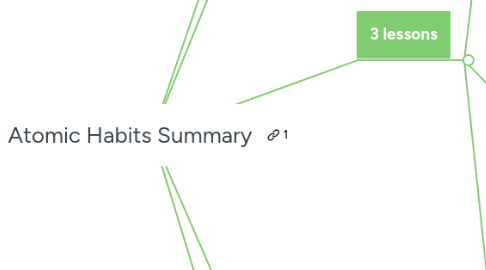
1. 1-Sentence-Summary
1.1. Atomic Habits is the definitive guide to break bad behaviors and adopt good ones in four steps, showing you how small, incremental, everyday routines compound and add up to massive, positive change over time.
2. Favorite quote from the author:
2.1. “Habits are the compound interest of self-improvement.” ― James Clear
3. 3 lessons
3.1. Every time we perform a habit, we execute a four-step pattern: cue, craving, response, reward.
3.1.1. Cue
3.1.1.1. A piece of information that suggests there’s a reward to be found, like the smell of a cookie or a dark room waiting to light up.
3.1.2. Craving
3.1.2.1. The motivation to change something to get the reward, like tasting the delicious cookie or being able to see.
3.1.3. Response
3.1.3.1. Whatever thought or action you need to take to get to the reward.
3.1.4. Reward
3.1.4.1. The satisfying feeling you get from the change, along with the lesson whether to do it again or not.
3.2. If we want to form new habits, we should make them obvious, attractive, easy, and satisfying.
3.2.1. Make it obvious.
3.2.1.1. Don’t hide your fruits in your fridge, put them on display front and center.
3.2.2. Make it attractive.
3.2.2.1. Start with the fruit you like the most, so you’ll actually want to eat one when you see it.
3.2.3. Make it easy.
3.2.3.1. Don’t create needless friction by focusing on fruits that are hard to peel. Bananas and apples are super easy to eat, for example.
3.2.4. Make it satisfying.
3.2.4.1. If you like the fruit you picked, you’ll love eating it and feel healthier as a result!
3.3. You can use a habit tracker as a fun way to measure your progress and make sure you don’t fall off the wagon.
3.3.1. With a framework like this, making and breaking habits becomes fun. You’ll likely want to tackle multiple things sooner rather than later, but it’s important to not take on too much at once.
3.3.2. Track your habits with a habit tracker.
3.3.3. Keep a record of all the behaviors you want to establish or abandon and, at the end of each day, you mark which ones you succeeded with.
3.3.3.1. This record can be a single piece of paper, a journal, a calendar, or a digital tool, like an app.

